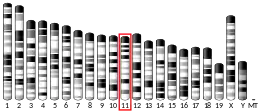DRG1
Developmentally-regulated GTP-binding protein 1 is a protein that in humans is encoded by the DRG1 gene.[5][6][7]
References
- GRCh38: Ensembl release 89: ENSG00000185721 - Ensembl, May 2017
- GRCm38: Ensembl release 89: ENSMUSG00000020457 - Ensembl, May 2017
- "Human PubMed Reference:". National Center for Biotechnology Information, U.S. National Library of Medicine.
- "Mouse PubMed Reference:". National Center for Biotechnology Information, U.S. National Library of Medicine.
- Schenker T, Lach C, Kessler B, Calderara S, Trueb B (Nov 1994). "A novel GTP-binding protein which is selectively repressed in SV40 transformed fibroblasts". J Biol Chem. 269 (41): 25447–53. PMID 7929244.
- Sazuka T, Tomooka Y, Ikawa Y, Noda M, Kumar S (Dec 1992). "DRG: a novel developmentally regulated GTP-binding protein". Biochem Biophys Res Commun. 189 (1): 363–70. doi:10.1016/0006-291X(92)91567-A. PMID 1449490.
- "Entrez Gene: DRG1 developmentally regulated GTP binding protein 1".
Further reading
- Sazuka T, Kinoshita M, Tomooka Y, et al. (1992). "Expression of DRG during murine embryonic development". Biochem. Biophys. Res. Commun. 189 (1): 371–7. doi:10.1016/0006-291X(92)91568-B. PMID 1280421.
- Mahajan MA, Park ST, Sun XH (1996). "Association of a novel GTP binding protein, DRG, with TAL oncogenic proteins". Oncogene. 12 (11): 2343–50. PMID 8649774.
- Zhao XF, Aplan PD (1999). "SCL binds the human homologue of DRG in vivo". Biochim. Biophys. Acta. 1448 (1): 109–14. doi:10.1016/s0167-4889(98)00129-3. PMID 9824680.
- Dunham I, Shimizu N, Roe BA, et al. (1999). "The DNA sequence of human chromosome 22". Nature. 402 (6761): 489–95. doi:10.1038/990031. PMID 10591208.
- Li B, Trueb B (2000). "DRG represents a family of two closely related GTP-binding proteins". Biochim. Biophys. Acta. 1491 (1–3): 196–204. doi:10.1016/s0167-4781(00)00025-7. PMID 10760581.
- Strausberg RL, Feingold EA, Grouse LH, et al. (2003). "Generation and initial analysis of more than 15,000 full-length human and mouse cDNA sequences". Proc. Natl. Acad. Sci. U.S.A. 99 (26): 16899–903. doi:10.1073/pnas.242603899. PMC 139241. PMID 12477932.
- Bandyopadhyay S, Pai SK, Gross SC, et al. (2003). "The Drg-1 gene suppresses tumor metastasis in prostate cancer". Cancer Res. 63 (8): 1731–6. PMID 12702552.
- Bandyopadhyay S, Pai SK, Hirota S, et al. (2004). "Role of the putative tumor metastasis suppressor gene Drg-1 in breast cancer progression". Oncogene. 23 (33): 5675–81. doi:10.1038/sj.onc.1207734. PMID 15184886.
- Collins JE, Wright CL, Edwards CA, et al. (2005). "A genome annotation-driven approach to cloning the human ORFeome". Genome Biol. 5 (10): R84. doi:10.1186/gb-2004-5-10-r84. PMC 545604. PMID 15461802.
- Gerhard DS, Wagner L, Feingold EA, et al. (2004). "The Status, Quality, and Expansion of the NIH Full-Length cDNA Project: The Mammalian Gene Collection (MGC)". Genome Res. 14 (10B): 2121–7. doi:10.1101/gr.2596504. PMC 528928. PMID 15489334.
- Rual JF, Venkatesan K, Hao T, et al. (2005). "Towards a proteome-scale map of the human protein-protein interaction network". Nature. 437 (7062): 1173–8. doi:10.1038/nature04209. PMID 16189514.
- Bandyopadhyay S, Wang Y, Zhan R, et al. (2007). "The tumor metastasis suppressor gene Drg-1 down-regulates the expression of activating transcription factor 3 in prostate cancer". Cancer Res. 66 (24): 11983–90. doi:10.1158/0008-5472.CAN-06-0943. PMID 17178897.
This article is issued from Wikipedia. The text is licensed under Creative Commons - Attribution - Sharealike. Additional terms may apply for the media files.



